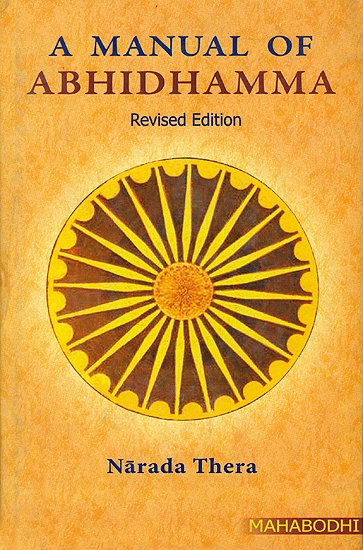Abhidhamma in Daily Life (by Ashin Janakabhivamsa)
by Ashin Janakabhivamsa | 66,666 words
English translation of "Abhidhamma in Daily Life" by Professor Ko Lay. Revised by Sayadaw U Silananda, International Theravada Buddhist Missionary University, Yangon, 1999...
Factor 8 - Mettá (loving-kindness)
There is particular mental factor (cetasika) such as mettá. The adosa cetasika when it is meant to connote wishing others welfare, peace and progress, is known as mettá. Therefore mettá is the sincere will to help others, to see other prosper and to radiate loving-kindness to others.
False Mettá
There is also a form of mettá, which exists among relatives, lovers, husbands and wives. Such mettá also constitute wish and deeds of helpfulness to each other. They are said to be 'in love' with one another. They also used the word mettá for this type of attachment. But it is actually lust or attachment termed gehasitapema - love for the household already treated under 'lobha'. This is not true and sincere mettá, loving-kindness.
Once a layman approached his reverend Bhikkhu and asked him the proper way to practice mettá bhávaná. The Bhikkhu said, “Start radiating mettá on the one you love best”. So, as he loved his wife best, he started mettá meditation on her that night just outside her room. After some time he became so overcome with love that he rushed to her room. As the door was bolted shut he bump his head at the door and received bruises. This kind of love is called gehasitapema.
A Cow’s Love for Her Calf
One cannot say such forms of pema never develop into true mettá; even a cow’s love for her calf can bring about arising of kusala citta (wholesome consciousness). Once upon a time, while a cow was breast-feeding her young calf with true mettá, a hunter threw a spear at her. But, due to her immense mettá for her calf, the spear became flaccid like a palm leaf and caused her no harm at all. This is the evidence that love between relatives; friends, husband and wife, parents and children can be developed into true mettá.
The Mettá Of Queen Samavati
In the ancient kingdom of Kosambi, King Utena had three queens, namely Samavati, Magandi and Vasuladattadevi. While Samavati was devoted to the Ti Ratana (Three Gems) and Magandi, since her maiden days bore a grudge against the Buddha. She used to find fault on Samavati, who always practiced mettá bhávaná. King Utena rotated his visits to the three chambers of his queen respectively; and he was very dexterous with the harp.
One day, when the turn to visit Samavati’s room came, Magandi put a poisonous snake which she got from her uncle, into the cavity of the King’s harp and placed many garlands so as to stop the snake from coming out. Then she told the King not to go to Samavati’s chamber as she had horrid nightmare to be interpreted as bad omen. But the King, heedless of her warning, went to his beloved’s chamber. Magandi followed him as if she was concerned about the King’s safety.
When the King reclined on Samavati’s couch after dinner, she secretly removed the garlands to let the snake out of the cavity. The snake being full of fury made a hissing sound and approached the King. Magandi pretended to be shocked, scolded Samavati and her attendants and blamed the King for not listening to her warning.
King Utena, being ignorant of Magandi’s sinister plot, got very angry and picked up his bow and arrow to shoot the innocent Queen and her attendants.
At that moment, Samavati told her attendants no to feel hatred or anger, against the King and Magandi but only to propagate mettá, as they have always been doing (loving-kindness) to them. She said expect mettá there was no savior in sight at such a time. She urged all to emanate mettá thoughts to both the King and Magandi as much as possible, and dispel all thoughts of grudge, anger and revenge.
So the attendants well tamed under the guidance of Queen Samavati, cultivated loving-kindness to King Utena and Magandi. The angry King could not conquer his anger and released an arrow. Due to the power of mettá, the arrow turned back towards him. At once the King recovered his senses and kneeling in front of Samavati, begged for forgiveness. He now realized his own thoughtlessness.
Moral of the Jataka
Queen Magandi was envious and jealous of Queen Samavati who was more beautiful and popular. She was infested with issa and dosa. She plotted evil schemes with maya. King Utena, on seeing the snake, was overcome with dosa. When the arrow boomeranged, he experienced great fear under the influence of dosa domanassa. Queen Samavati and her attendants being basically good-natured propagated mettá even towards their enemies.
In this age, those who want to live a highly virtuous life should emulate the attitude and behavior of Queen Samavati. In the face of envy, jealousy and ill will one should improve one’s mind and extinguish the desire to avenge on others. Given the opportunity to do service to others, do so even to those who have malicious to you. Make good use of the priceless weapon known as mettá. Mettá is water; dosa is fire. The more the water, the easier it is to flight the flames. Therefore, one ought to try to diminish one’s anger and foster loving-kindness.
